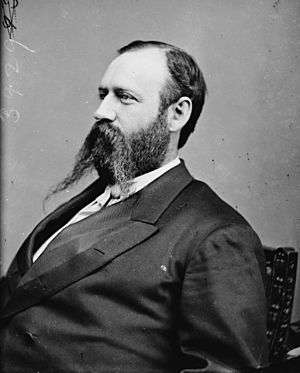Rufus Bullock facts for kids
Quick facts for kids
Rufus Bullock
|
|
|---|---|
 |
|
| 46th Governor of Georgia | |
| In office July 4, 1868 – October 30, 1871 |
|
| Preceded by | Thomas H. Ruger |
| Succeeded by | Benjamin F. Conley |
| Personal details | |
| Born | March 28, 1834 Bethlehem, New York, U.S. |
| Died | April 27, 1907 (aged 73) Albion, New York, U.S. |
| Political party | Republican |
| Signature | |
| Military service | |
| Allegiance | |
| Branch/service | |
| Rank | |
| Unit | Quartermaster's Office |
| Battles/wars | American Civil War |
Rufus Brown Bullock (March 28, 1834 – April 27, 1907) was an important politician and businessman in Georgia. He was a member of the Republican Party. During the time after the American Civil War called the Reconstruction Era, he served as Georgia's governor.
As governor, he wanted everyone to have fair chances in business and equal political rights, no matter their race. He also supported public schools for both Black and white children. Bullock encouraged the growth of railroads, banks, and factories in Georgia. He even asked the national government for military help to protect the rights of freed people (formerly enslaved people). This made him very unpopular with some people in the state. He had to leave Georgia before his term as governor ended. Later, he returned to Georgia and was found not guilty of any wrongdoing. For many years after, he was a respected private citizen.
Contents
Early Life and Career
Rufus Bullock was born in Bethlehem, New York. In 1857, he moved to Augusta, Georgia. He worked there for a telegraph company called Adams Express.
Governor of Georgia
Bullock served as the 46th Governor of Georgia from 1868 to 1871. He was the first Republican governor of the state. This period, known as Reconstruction, was when the Southern states were being rebuilt after the Civil War.
Georgia Rejoins the Union
After the Civil War, Georgia had to agree to the Fourteenth Amendment. This amendment gave citizenship and equal rights to all people born in the U.S., including formerly enslaved people. Once Georgia approved this, the state was allowed to send representatives to the U.S. Congress again.
Challenges as Governor
However, things became difficult. The Georgia state government removed 28 Black members from their positions. They also stopped Black citizens from voting in the 1868 presidential election. Governor Bullock asked the national government for help. Because of these actions, Georgia was again placed under military rule. This decision made Bullock a very disliked figure in Georgia.
Resignation and Later Life
Due to various accusations and strong opposition, Bullock resigned as governor in 1871. He felt it was safer to leave the state for a while. Benjamin F. Conley, the president of the Georgia State Senate, finished the last two months of Bullock's term. After Conley, a Democrat named James Milton Smith became governor. No Republican would be governor of Georgia again until Sonny Perdue in 2003.
Life After Politics
After his time as governor, Bullock continued his business career. In 1867, he was the president of the Macon and Augusta Railroad. He also started the Augusta First National Bank. Later, he became president of the Atlanta Chamber of Commerce.
In 1895, Bullock was the master of ceremonies for the Cotton States and International Exposition. This was a big event to show off the South's progress. Bullock introduced the famous speaker Booker T. Washington, who gave his well-known "Atlanta Compromise" speech there.
Death and Legacy
Rufus Bullock passed away in Albion, New York, in 1907. He was buried in Mt. Albion Cemetery nearby.
People have different opinions about Rufus Bullock. Some have criticized him, while others admire him. The New Georgia Encyclopedia says he was the last governor in Georgia to push for progress until Jimmy Carter became governor much later.
It is interesting to note that he is the only Georgia governor since 1850 who does not have a portrait in the Georgia State Capitol building.
See also
 In Spanish: Rufus Bullock para niños
In Spanish: Rufus Bullock para niños
 | Lonnie Johnson |
 | Granville Woods |
 | Lewis Howard Latimer |
 | James West |

